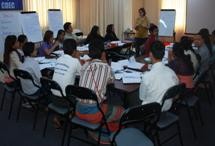
For decades, conflict-affected communities in Burma have experienced limited international assistance. However, the country's recent political reforms have reversed that trend—but with a cost. Despite the best of intentions, the newfound assistance has the potential to shift power dynamics and exacerbate local conflict by inadvertently shifting power dynamics and introducing new resources to be competed over.
in April 2013, USAID’s Office of Transition Initiatives provided conflict sensitivity training to local development partners among aid agencies and civil society organizations working in Burma’s conflict zones. The training is designed to improve the effectiveness of the growing rate of international assistance in complex communities throughout Burma by providing participants with the tools to conduct a careful analysis of the conflict. The analysis includes examining exactly how the aid program could alter the fragile situation, including the unintentional injection of new dynamics. By teaching local organizers to be sensitive to the changes, they are better able to minimize potential negative outcomes.
In partnership with Boston-based CDA Collaborative Learning Projects, USAID delivered a six-day Do No Harm training of trainers program with the local organization Comprehensive Development Education Center. Sixteen community leaders, who had previously received basic Do No Harm training, participated in the program that strengthened their ability to understand and implement the training's participatory, community-based conflict analysis.
Participants engaged in a broad range of exercises, and gained practical experience in how to use their new skills to engage others in mitigating conflict during development activities. Through the program, the trainers developed strong bonds and skills, which they will share with their communities and hone during an assessment program later in the year.
“I would like to thank OTI for their generous support and contribution to the Do No Harm training of trainers program, which has been a positive learning environment to build the capacity of local Do No Harm practitioners in the future, ” noted one participant.
"I do understand I am responsible to share my gained knowledge with others in order to build peaceful community in Myanmar," said another.







Comment
Make a general inquiry or suggest an improvement.